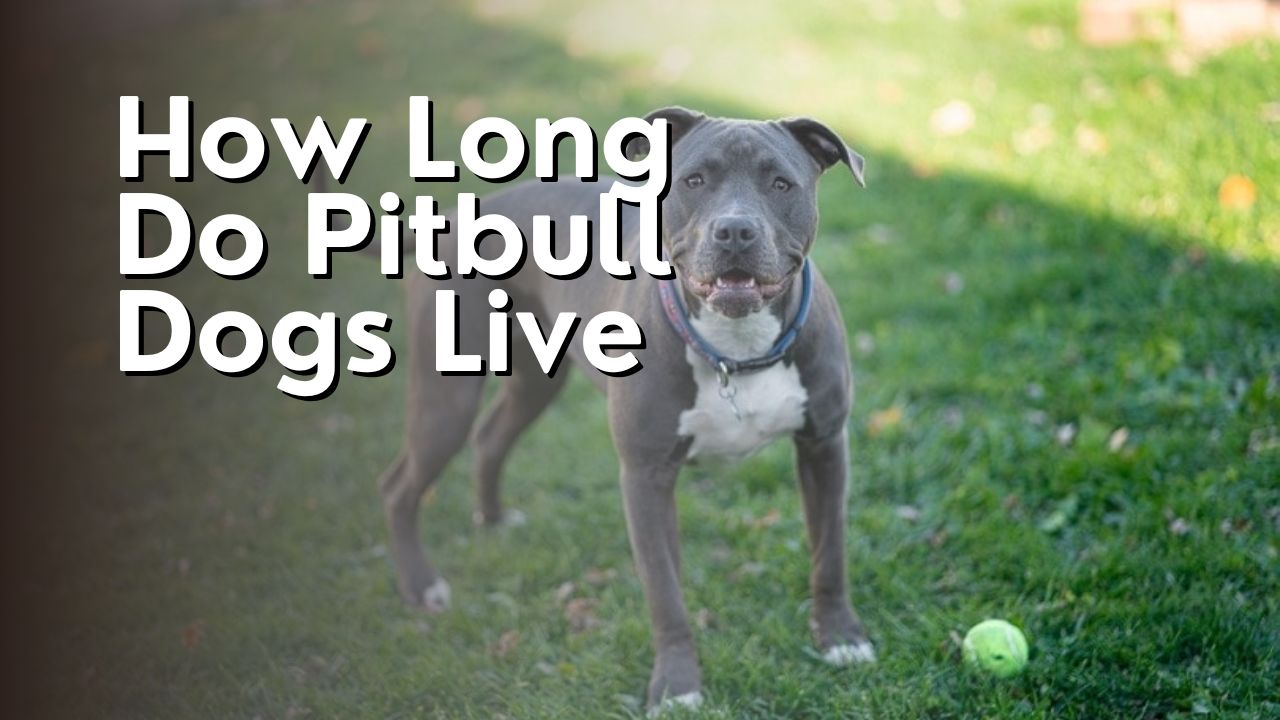Hey there! Ever wondered how long our beloved pitbull dogs can live? Well, I’ve got some interesting information for you. In this article, we will explore the average lifespan of pitbull dogs and the factors that can affect their longevity.
As a proud pitbull owner myself, I understand the importance of ensuring a long and healthy life for our furry friends. That’s why I will also be sharing some tips that can help you in providing the best care possible for your pitbull.
Additionally, we will discuss common health issues that pitbulls may face, debunking any myths or misconceptions surrounding their lifespan. It’s crucial to have accurate knowledge so that we can give our pitbulls the love and attention they deserve.
So, let’s dive in and discover how long our pitbull dogs can live, and how we can be proactive in ensuring their well-being.
Average Lifespan of Pitbull Dogs
Did you know that pitbull dogs can live on average for about 12 to 16 years? That’s a good amount of time to create wonderful memories with these loyal and loving companions. Pitbulls are known for their strength, agility, and friendly nature, making them popular pets for many families. However, it’s important to note that the lifespan of a pitbull can vary depending on various factors such as genetics, diet, exercise, and overall health care.
Proper nutrition plays a vital role in extending the lifespan of pitbull dogs. Feeding them a well-balanced diet that meets their nutritional needs is essential. Regular exercise is also crucial in keeping them physically fit and mentally stimulated. Taking them for daily walks, providing them with playtime, and engaging in activities that challenge their intelligence can contribute to their overall well-being.
Regular veterinary check-ups are essential for ensuring the health and longevity of pitbulls. Vaccinations, preventive treatments for parasites, and early detection of any potential health issues can significantly impact their lifespan. Additionally, providing them with a safe and loving environment, socializing them with other animals and people, and giving them plenty of love and attention can enhance their quality of life and potentially extend their lifespan.
In conclusion, the average lifespan of pitbull dogs ranges from 12 to 16 years. By providing them with proper nutrition, regular exercise, veterinary care, and a loving environment, we can help ensure that these incredible dogs live a long and happy life by our side.

Factors Affecting Pitbull Lifespan
When discussing the factors that can affect the lifespan of pitbull dogs, it is important to consider genetics and breeding. This plays a crucial role in determining the overall health and well-being of pitbulls.
Another factor to consider is diet and nutrition. Providing a balanced and nutritious diet is essential for maintaining the health of pitbulls.
In addition to genetics and diet, exercise and physical activity also play a significant role. Regular exercise helps to keep pitbulls fit and healthy, contributing to their overall well-being.
By understanding and addressing these factors, we can ensure that pitbulls live long, happy, and healthy lives.
Genetics and Breeding
To gain a deeper understanding of pitbull dogs’ lifespan, it is important to explore the intricate realm of genetics and breeding. Genetics plays a crucial role in determining a pitbull’s lifespan. Responsible breeders carefully select mating pairs to reduce the risk of genetic diseases that can shorten a dog’s life.
Moreover, breeding practices also contribute to a pitbull’s overall health and lifespan. Breeders who prioritize the well-being and longevity of the breed focus on breeding dogs with good temperaments, strong immune systems, and sound physical structures. By doing so, they aim to produce healthier puppies with a higher chance of living longer, fulfilling lives.
It is vital to acknowledge the impact of genetics and responsible breeding on the lifespan of pitbull dogs.
- Selective breeding promotes healthier genetics
- Responsible breeders prioritize longevity and overall well-being
- Healthy puppies have a higher chance of a longer lifespan.
Diet and Nutrition
You can enhance your pitbull’s lifespan by providing them with a nourishing diet and ensuring they receive the proper nutrition they need to thrive. A balanced diet is crucial for their overall health and longevity. It’s important to feed them high-quality dog food that is specifically formulated for their breed and age. Make sure to include a good mix of protein, carbohydrates, and healthy fats. Additionally, incorporating fresh fruits and vegetables into their diet can provide essential vitamins and minerals. I recommend consulting with a veterinarian to determine the right portion sizes and feeding schedule for your pitbull. By prioritizing their nutrition, you can help your pitbull live a long and healthy life.
| Food Group | Examples |
|---|---|
| Protein | Chicken, beef, fish |
| Carbohydrate | Brown rice, sweet potatoes |
| Healthy fats | Salmon oil, flaxseed oil |
| Fruits | Blueberries, apples |
| Vegetables | Broccoli, carrots |
Exercise and Physical Activity
Engaging in regular physical activity and exercise is essential for maintaining your pitbull’s overall well-being and promoting a healthy lifestyle. Pitbulls are energetic and active dogs, so they require daily exercise to burn off excess energy and stay physically fit. A minimum of 30 minutes to an hour of exercise per day is recommended.
This can include activities such as brisk walks, jogging, playing fetch, or even participating in dog sports like agility or obedience training. Regular exercise helps to keep your pitbull’s muscles strong, prevents obesity, and improves cardiovascular health. Additionally, exercise provides mental stimulation, which helps to reduce boredom and destructive behavior.
Remember to tailor the intensity and duration of exercise to your pitbull’s age, health condition, and individual needs. Always consult with your veterinarian to ensure you are providing the appropriate amount and type of exercise for your pitbull.
Tips for Ensuring a Long and Healthy Life for Your Pitbull
When it comes to ensuring a long and healthy life for my Pitbull, there are three key points that I always keep in mind.
First and foremost, regular veterinary check-ups are essential to catch any potential health issues early on.
Secondly, providing my Pitbull with proper nutrition and a balanced diet is crucial for their overall well-being.
And lastly, regular exercise and mental stimulation are important to keep them physically fit and mentally sharp.
By following these three tips, I can give my Pitbull the best chance at living a long and healthy life.
Regular Veterinary Check-ups
Regular veterinary check-ups are crucial for ensuring the health and longevity of your pitbull dog. Regular visits to the vet can help detect any potential health issues early on and prevent them from becoming more serious. During these check-ups, the veterinarian will conduct a thorough physical examination, update vaccinations, and perform necessary tests to assess your dog’s overall health. Additionally, the vet can provide important advice on nutrition, exercise, and any specific care needed for your pitbull. To emphasize the importance of regular check-ups, here is a table showcasing the potential benefits:
| Benefits of Regular Veterinary Check-ups |
|---|
| Early detection of health issues |
| Prevention of serious illnesses |
| Guidance on proper care and nutrition |
By prioritizing regular veterinary check-ups, you can help ensure that your pitbull lives a long and healthy life.
Proper Nutrition and Balanced Diet
Ensuring that your pitbull stays healthy and vibrant starts with providing them with proper nutrition and a balanced diet. As a responsible pet owner, it’s important to understand that what you feed your pitbull significantly impacts their overall health and lifespan.
A balanced diet for your pitbull should consist of high-quality proteins, healthy fats, and a variety of fruits and vegetables. It’s crucial to avoid feeding them table scraps or low-quality commercial dog food that may contain fillers and unhealthy additives.
Additionally, it’s essential to consult with your veterinarian to determine the appropriate portion sizes and feeding schedule for your pitbull based on their age, weight, and activity level. Remember, a well-balanced diet combined with regular exercise and veterinary check-ups can help your pitbull live a long and happy life.
Regular Exercise and Mental Stimulation
To keep your pitbull healthy and happy, it’s important to make sure they get plenty of exercise and mental stimulation. Regular exercise not only helps maintain a healthy weight, but it also strengthens their muscles and joints. It’s recommended to engage in activities such as daily walks, playing fetch, or even swimming if possible.
Mental stimulation is equally vital for pitbulls as it helps prevent boredom and destructive behavior. Here are a few activities you can try:
- Puzzle toys: These toys challenge their problem-solving skills and keep their minds active.
- Training sessions: Teaching them new commands or tricks is a great way to provide mental stimulation.
- Hide and seek: Hide treats or toys around the house and let them search for them.
- Interactive play: Engage in games that require them to think and strategize, like tug-of-war or agility courses.
By incorporating regular exercise and mental stimulation into your pitbull’s routine, you’ll help ensure a long and fulfilling life for your furry friend.
Common Health Issues in Pitbulls
In my experience as a pitbull owner, I’ve come across several common health issues that can affect these dogs.
One of the most prevalent ones is hip dysplasia, which can cause discomfort and mobility issues.
Additionally, allergies are quite common in pitbulls, leading to skin irritations and constant itching.
Lastly, heart disease is another health concern that can impact the lifespan and quality of life of these dogs.

Hip Dysplasia
Did you know that hip dysplasia can significantly impact the lifespan of your pitbull, shortening their years of companionship? It is a common health issue in pitbulls, especially as they age. Hip dysplasia occurs when the hip joint doesn’t develop properly, leading to instability and eventually arthritis. This condition can cause pain, lameness, and difficulty in getting up or walking. While it can be managed with medication, physical therapy, and even surgery, it is important to note that it can still affect the overall quality of life for your pitbull. Regular exercise, a balanced diet, and maintaining a healthy weight can help reduce the risk of hip dysplasia. Below is a table that compares the signs, causes, and treatment options for hip dysplasia in pitbulls.
| Signs | Causes | Treatment |
|---|---|---|
| Lameness | Genetic factors | Medication |
| Pain | Obesity | Physical therapy |
| Difficulty in | Excessive | Surgery (in severe cases) |
| getting up or | growth rate | |
| walking |
Allergies
Allergies can significantly impact the comfort and well-being of my furry companion, affecting their overall quality of life. They can manifest in various ways, such as skin irritations, itching, and gastrointestinal issues.
Managing allergies in pitbull dogs requires a proactive approach to minimize discomfort and prevent complications. Here are three important things to consider:
- Identification: Identifying the specific allergen(s) that trigger your pitbull’s symptoms is crucial. Common allergens include pollen, dust mites, certain foods, and flea bites. Consulting with a veterinarian and conducting allergy testing can help pinpoint the allergen(s) and guide the management plan.
- Allergen avoidance: Reducing exposure to allergens is essential in minimizing allergic reactions. This may involve keeping your pitbull indoors during high pollen seasons, using hypoallergenic bedding, and using flea preventatives to avoid flea allergies.
- Medications and treatments: Depending on the severity of the allergies, your veterinarian may prescribe antihistamines, corticosteroids, or immunotherapy to alleviate symptoms and boost your pitbull’s immune system.
By following these steps, I can ensure that my pitbull lives a comfortable and allergy-free life.
Heart Disease
Heart disease can impact your furry friend’s overall well-being and quality of life. As a pitbull owner, it’s important to be aware of the potential health issues that can affect our beloved pets. Heart disease in pitbulls is not uncommon and can significantly reduce their lifespan if left untreated.
Symptoms such as coughing, difficulty breathing, and decreased energy levels may indicate a heart problem. Regular check-ups with a veterinarian and early detection are crucial for managing and treating this condition.
Treatment options may include medication, dietary changes, and exercise restrictions. It’s essential to provide a heart-healthy lifestyle for your pitbull, ensuring they receive proper care, love, and attention to help them live a long and happy life.
Pitbull Lifespan Myths and Misconceptions
Contrary to popular belief, pitbulls can live a fulfilling and healthy life span, debunking prevalent myths and misconceptions surrounding their longevity. These strong and resilient dogs have the potential to live just as long as any other breed, if not longer. Here are three important points to consider:
- Proper care: Just like any other dog, pitbulls require proper care to ensure a long and healthy life. This includes regular exercise, a balanced diet, routine vet visits, and lots of love and attention. By providing them with these essentials, pitbulls can thrive and live a full life.
- Genetics: It is true that pitbulls may be prone to certain health issues, such as hip dysplasia or allergies. However, not all pitbulls will develop these conditions, and with responsible breeding practices, the risk can be minimized. By selecting a reputable breeder and ensuring the parents have good health records, you can increase the chances of your pitbull living a long and healthy life.
- Individual factors: Just like humans, each pitbull is unique and may have different health outcomes. Factors such as genetics, lifestyle, and environment can influence their lifespan. By providing a loving and nurturing home, along with regular veterinary care, you can give your pitbull the best chance at a long and happy life.
In conclusion, pitbulls can live a fulfilling and healthy life span, contrary to popular misconceptions. With proper care, responsible breeding, and individual factors taken into account, these amazing dogs can bring joy and companionship for many years.
Frequently Asked Questions
Are all Pitbull breeds prone to the same health issues?
Yes, all pitbull breeds are prone to certain health issues. It’s important to be aware of conditions like hip dysplasia, allergies, and certain types of cancer that can affect pitbulls.
Can a Pitbull’s lifespan be extended through proper diet and exercise?
Yes, a pitbull’s lifespan can be extended through proper diet and exercise. Providing nutritious food and regular exercise helps maintain a healthy weight, reduces the risk of certain health issues, and promotes overall longevity.
Do Pitbulls have a higher risk of developing certain genetic diseases?
Yes, pitbulls have a higher risk of developing certain genetic diseases. It is important to be aware of these risks and to work closely with a veterinarian to ensure their health and well-being.
What are some common behavioral issues that can affect a Pitbull’s lifespan?
Some common behavioral issues that can affect a pitbull’s lifespan include aggression, separation anxiety, and destructive behavior. These issues can lead to stress and potentially shorten a pitbull’s lifespan if not properly addressed and managed.
Are there any specific environmental factors that can impact a Pitbull’s lifespan?
Specific environmental factors such as a healthy diet, regular exercise, proper veterinary care, and a safe living environment can all positively impact a pitbull’s lifespan.
Conclusion
In conclusion, pitbull dogs can live an average lifespan of 12 to 14 years with proper care and attention.
Factors such as genetics, diet, exercise, and veterinary care play a significant role in their longevity.
By providing a balanced diet, regular exercise, routine vaccinations, and regular check-ups, you can ensure a long and healthy life for your pitbull.
It is important to debunk the myths and misconceptions surrounding pitbull lifespans and focus on giving them the love and care they deserve.


